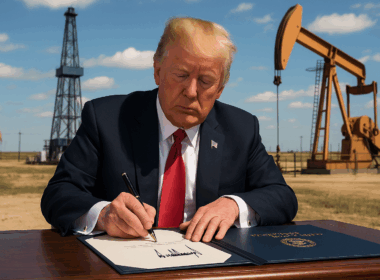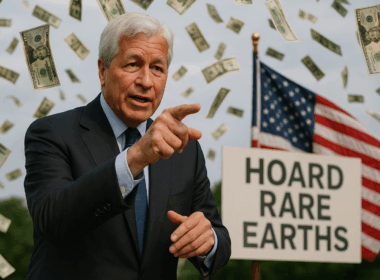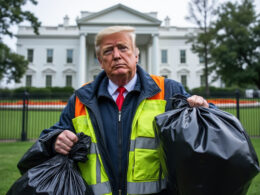You may have missed the news on Brexit this week.
Lost in the political firestorm of Donald Trump’s RussiaGate hearings comes the news that Queen Elizabeth gave her Royal Assent to the Brexit bill.
Great Britain is now free to jump off the cliff created by the Brexit referendum last year, and Prime Minister Theresa May plans to take that jump on March 29.
It all reminds me of two farmers who jump off a cliff to find ‘greener pastures’:
Day after day two farmers stood on the edge of a huge cliff to take in the view.
They would look out over the pristine pastures below, and complain about the way their lives were going.
Their farm on the mountain was difficult to work. They were sick of the people they worked with, fed up with the people who bought their crops, and especially annoyed with their neighbours from the surrounding villages, who kept coming to the farm when they weren’t invited.
Miles below, the farmers could see what appeared to be green pastures, sparkling blue rivers and lakes, and best of all, no pesky neighbours to come by and visit.
One day, they decided to jump off the cliff.
Halfway down, one farmer turns to the other and says, “Hey, this worked out better than I thought!”
The other farmer says, “Yeah, but I hear the landing’s a bit rough.”
Likewise, for the UK, the landing post-Brexit could be pretty rough … or, according to some, the ‘farmers’ could actually do better alone than they’ve done with the EU.
So, what is the impact of Brexit on the UK? And how will it affect the rest of us? Is it really going to be the disaster that critics have predicted?
It’s hard to know because Britain simply hasn’t landed yet.
But, the early indications are that Britain may do just fine, thank you very much.
If certain events occur, the landing could be relatively soft, and the people who voted for Brexit would applaud their choice. The United Kingdom is, after all, the world’s fifth largest economy, and the leading financial centre for all of Europe. Great Britain possesses strengths that won’t go away just because the EU countries imposes some trade tariffs.
However, it is also true that if certain events occur, the impact on the UK could be catastrophic, and transform one of the world’s great powers into a global also-ran.
THE ARGUMENT FOR BREXIT AS A POSITIVE FORCE
Taking the optimistic line, Brexit could in fact have a positive impact on the British economy, and at the same time satisfy voter’s demand for a ‘more British Britain’.
Many Brits saw the EU guarantee of ‘free movement’ within member states as a means for people from less affluent countries to steal British jobs. Some, frankly, just didn’t like seeing so many ‘foreigners’ coming to the country.
The bogeyman presented to counter this argument was that leaving the EU would irreparably damage the British economy … but in the months following the vote many analysts say the impact will either be negligible, or possibly even positive.
The government’s trade statistics show that about half of all British exports go to other EU countries.
By leaving Brexit, critics say British exports could be massively curtailed if the EU imposes tariffs on the UK.
But a report by Woodford Funds disputes this.
Woodford’s report concludes it’s likely that the EU and Britain would in fact come to a beneficial trade agreement simply because Britain is too valuable to exclude.
But, even if that weren’t the case, Woodford says the imposition of tariffs would not be a huge deal.
“… the worst-case scenario, in which Britain faces tariffs under ‘most-favoured nation’ rules, is certainly no disaster,” says their report. “Exporters would face some additional costs, such as complying with the European Union’s rules of origin, if they were outside the single market. However, these factors would be an inconvenience rather than a major barrier to trade.
“In addition, falling tariffs, the decline in manufacturing and Europe’s diminishing importance in the global economy mean we doubt that even the absence of a trade deal with the European Union would hurt the United Kingdom’s overall exports materially.”
Woodford, and other analysts, believe that the benefits of being able to seek other trade deals, tailored to the needs of the UK, will more than offset the loss of EU membership.
In short, Woodford believes the UK will be just fine, whether they stayed in the EU or not.
“We continue to think that the United Kingdom’s economic prospects are good whether inside or outside the European Union. Britain has pulled ahead of the European Union in recent years, and we expect that gap to widen over the next few years regardless of whether Brexit occurs.”
There are signs that major corporations still consider Britain the place to be.
SOFT LANDING THREATENED BY HARDLINERS IN THE EU
Unfortunately, the hopes of a soft landing could be crushed.
There are hardliners in the European Union who want to make an example of Great Britain. They want to make sure an EU exit by Britain doesn’t look like a good idea to member states like the Netherlands, which had its own ‘Nexit’ movement.
There’s a risk the hardliners could accept the cost of worsened trade relations with Britain, for the political benefit of keeping the rest of the EU together.
This week European Commission President Jean-Claude Juncker warned this could be the case, saying other member states will “realize it’s not worth leaving” the EU after they see the deal Britain gets.
“They will all see from the UK’s example that leaving the EU is a bad idea,” Juncker said. “Half memberships and cherry-picking aren’t possible. In Europe you eat what’s on the table or you don’t sit at the table.”
So, the prospect of a soft landing could be ruined if the EU believes working with Britain threatens its political existence.
And that is what chills those who look at the long-term impact of Brexit.
Woodford’s analysis of the impact of Brexit is based on the notion that the EU will still give the UK a ‘favoured nation’ status in terms of trade.
If that doesn’t happen, all bets are off.
Toyota gave post-Brexit a vote of confidence this month, announcing it would invest £240 million upgrading its existing plant in Burnaston.
But Dr. Johan van Zyl, the president of Toyota Europe, also told the BBC he is watching the Brexit negotiations closely, saying, “Continued tariff-and-barrier free market access between the UK and Europe that is predictable and uncomplicated will be vital for future success.”
In other words, if tariffs are imposed on Britain, Toyota may shift production to the EU.
Nissan is even more cautious and put their expansion plans in the UK on hold, pending the result of the Brexit negotiations. The Japanese car company is just one of many holding off on investment decisions to see how the Brexit talks go.
If the hardliners win out, the impact on Britain could be much worse than the Brexiteers calculated.
The best case scenario for Britain would be negotiating membership in the European Economic Area (like Norway), but still be able to impose restrictions on immigration and free movement of people.
That’s not very likely, and the worst case scenario would be the EU imposing trade tariffs and barriers to give their own members a significant trade advantage.
In that case, the UK’s economy would get beaten up pretty badly, but so would the European Union’s.
AND THEN THERE’S THE PROSPECT OF A POST-BREXIT ‘KILTAGEDDON’
If anything puts a chill down the spine of both the pro-Brexit and anti-Brexit activists it’s the reaction of Scotland.
Scottish First Minister Nicola Sturgeon has demanded a second referendum on Scottish independence. The last referendum of course failed, with 55 per cent of Scots voting against separation from the UK.
Even now, should a referendum be called today, the polls show Scots are unlikely to back the separatist cause.
That could easily change, depending on how talks proceed with the EU.
As it stands, Scotland will also be separated from the European Union. If Great Britain continues to prosper, and Scotland doesn’t suffer economically, voters will likely choose to remain within the UK.
But if punitive trade sanctions cause a downturn in the British economy, Scotland could choose the EU over the United Kingdom.
Despite what anti-Brexit alarmists say, the truth is that Great Britain could easily sail through the post-Brexit period with a still-booming economy. The country is prosperous, powerful, and without the restrictions of the EU, Britain has the ability to form new trade bonds with other partners in the Commonwealth.
The problem is, that if the plan fails, and if Britain’s economy stumbles, there is a very real chance Scotland could separate, and take all of its North Sea oil with it.
Great Britain may well win its Brexit gamble … but the stakes are very high indeed if it fails.












